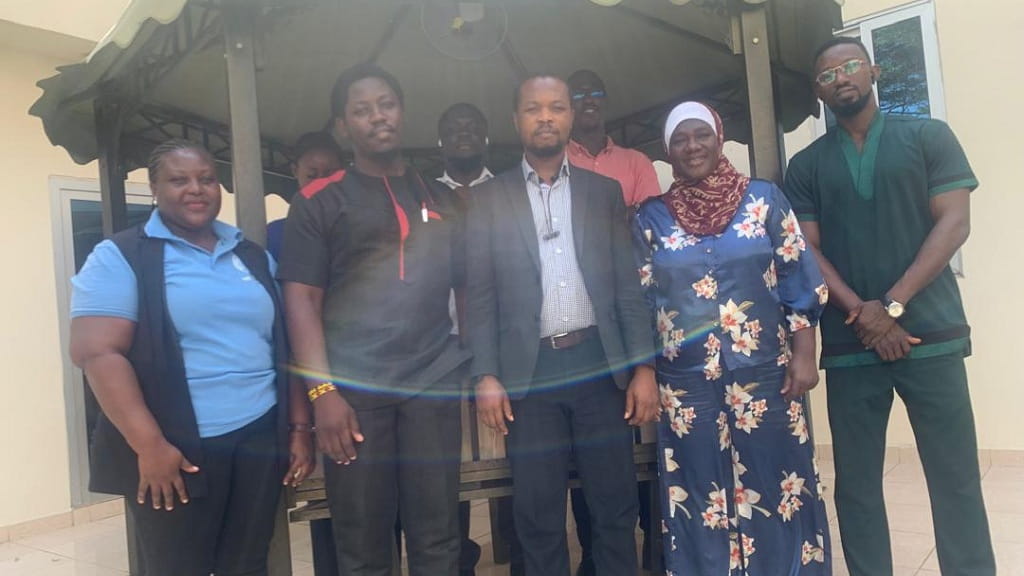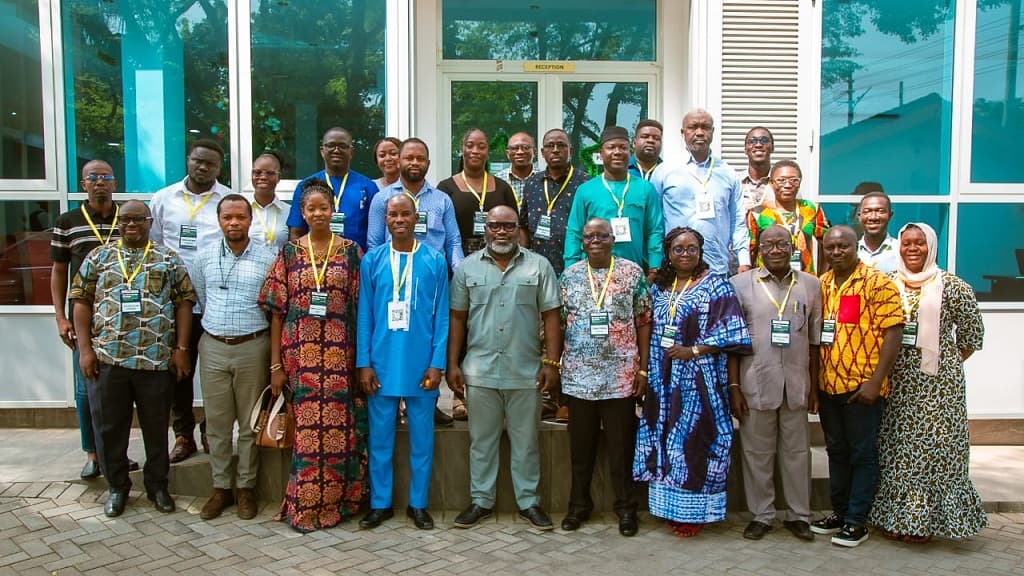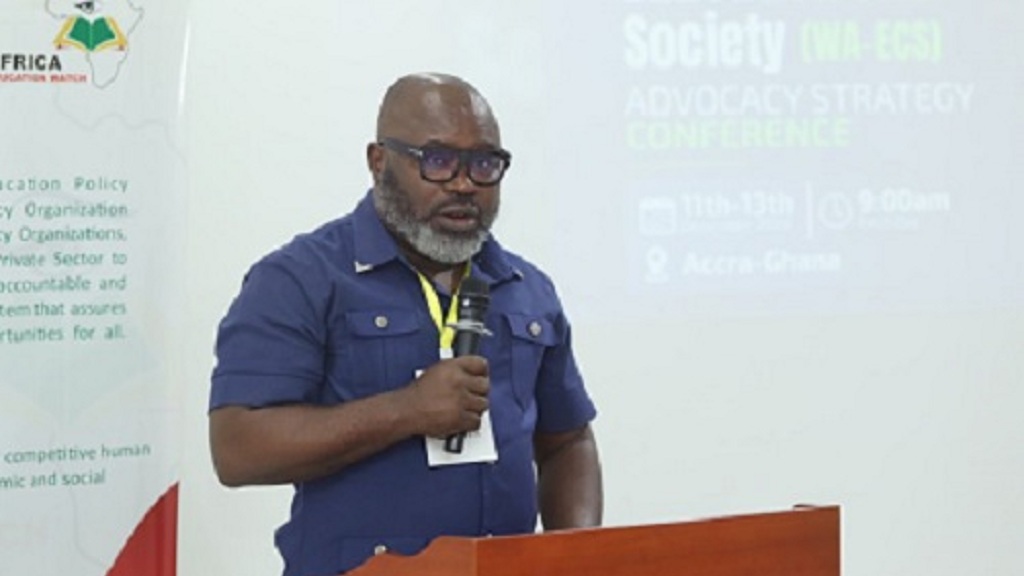Eduwatch Holds Stakeholder Validation Meeting On Model Green TVET Policy
|  | |
|
Eduwatch, on Thursday November 28, held a meeting with key stakeholders in the Technical and Vocational Education and Training (TVET) space, to validate a Model TVET Policy co-created by young people. The model policy seeks to guide the development of a National Green TVET policy to ensure Ghana's TVET sector is well positioned for the Green transition.
Youth groups in Ghana, cognisant of the harmful effects of climate change on their socioeconomic future, converged in Kumasi under the auspices of Eduwatch and the Foundation for Security and Development in Africa (FOSDA) in a meeting to co-create this model policy as a guide to designing a comprehensive inter-sectorial policy on climate-responsive TVET.
Participants in the validation meeting stressed the need for the model to have distinct roles for each stakeholder identified, and effective monitoring mechanisms put in place for effective implementation.
The model policy was duly reviewed and validated by stakeholders, and will be used to further engage key TVET policymakers for consideration. The validation meeting was facilitated by Eduwatch Programme Officer, Kwasi Nimo, with participants drawn from the Ministry of Education's TVET Directorate, the Ghana TVET Service, FOSDA and the Media.
© Africa Education Watch | |
|
|
|
Eduwatch Convenes West African Education Civil Society Organizations In Accra To Form Strategic Advocacy Platform
|  | |
|
From Wednesday December 11 to Friday December 13, Eduwatch with support from Oxfam held an international conference of West African education Civil Society Organizations (CSOs) involved in policy influencing and accountability in Accra. The objective of the Conference was to develop a strategy for policy influencing, education accountability and Gender Transformative Education within the subregion, while building the necessary cross-country relationships for lessons and knowledge sharing.
Member countries provided updates on the state of Basic Education, TVET, ICT, GESI, Education Governance and Climate in their respective countries. Participants co-created an Advocacy Strategy and Governance Structure as part of the formation of a West Africa Education Civil Society Civil (WA-ECS) Platform - The WA-ECS Platform. There was also a planning session for representative CSOs to outline key advocacies to be pursued within the next 6 months to one year, in tandem with the Platform's objectives.
The WA-ECS Platform was duly established/founded with 11 members including Francophone and Anglophone CSOs from The Gambia, Liberia, Nigeria, Sierra Leone, Mali, Benin, Togo, Burkina Faso, Côte d'Ivoire, Senegal and Ghana. Participants included CSOs from WAYNPEED from Sierra Leone, Gambia Participates, Connected Development from Nigeria, CENTAL from Liberia, COSYDEP from Senegal, FOSDA, NAGRAT, STAR-Ghana Foundation and ActionAid from Ghana, CBO-EPT from Benin, CNEPT from Burkina Faso, RIEPT from Côte d'Ivoire, CNT/ÈPT from Togo and COSC-EPT from Mali.
© Africa Education Watch
| |
|
|
|
Eduwatch Calls For Concerted Efforts To Implement ECOWAS Vision 2050
|  | |
|
Accra, Dec. 11, GNA – Mr Kofi Asare, Executive Director, Africa Education Watch (EduWatch), has called for a concerted civil society effort to implement the ECOWAS Agenda 2050.
“To enable the achievement of the objective of Vision 2050, it is imperative for member states to prioritise the implementation, especially of pillar four, which seeks to achieve transformative, inclusive, and sustainable development,” he said.
He said this at the opening of a three-day West Africa Education Civil Society Advocacy Conference in Accra.
The conference brought together Civil Society Organisation (CSO) leaders from Ghana, Togo, Côte d’Ivoire, Sierra Leone, Liberia, Nigeria, Senegal, Gambia, Benin, Guinea, and Mali with support from Oxfam Ghana.
The conference aimed to establish a common voice for education CSOs in West Africa to galvanise their experiences and competencies within ECOWAS to reinforce accountability in the implementation of education policies.
The implementation, he said, was important because of the unbalanced attainment of targets in Vision 2050.
“We believe that all civil society in the sub-region must come on board to attain balanced implementation of the key objectives and activities and strategies in the ECOWAS vision 2050.
He said the development of globally competitive human capital to drive the sub-region’s development was critical and fundamental to the success of the ECOWAS vision 2050.
Mr Asare said EduWatch had since 2019 been involved in transformative education policy influencing with support from Oxfam at the sub-regional level, working closely with the ECOWAS Secretariats and committees on education, science, and culture.
He said EduWatch, in partnership with FOSDA and other organisations, had made modest gains in gender-transformative education and climate-responsive Technical and Vocational Education and Training.
With this feat, he stressed, that it was important to build a network of policy-influential organisations within the sub-region to collaboratively pursue key transformative education objectives in the ECOWAS vision 2050.
He urged all participants to actively contribute to the discussions and recommend actionable approaches to achieve the objectives of the conference.
Mr Abdul Rahman Kays, Executive Director, West Africa Youth Network for Peace Education and Economic Development in Sierra Leone, said their government had made a budget allocation of 21 per cent to the education sector.
The Sierra Leone government, he stated, had made education free in 2018, from primary to the secondary level.
Among the challenges facing the country are insufficient learning materials and salary disparities among teachers and called on the authorities to address the problems.
Source: gna.com.gh
| |
|
|
|
Ghana: CSOs Strategize To Hold Government Accountable On ECOWAS Vision 2050
|  | |
|
Civil society organizations across West Africa convened in Accra to plan ways of demanding government accountability for implementing ECOWAS Vision 2050 on education.
The conference, hosted by Africa Education Watch (Eduwatch) in partnership with Oxfam Ghana, explored CSOs’ potential role in achieving educational goals under the Vision 2050 framework.
Participants emphasized collaboration and advocacy to ensure equitable and effective education policies in the region.
Source: wadr.org
| |
|
|
|
Delay Free SHS Bill For Broader Engagement – Eduwatch Advises Parliament
|  | |
|
Education think tank Africa Education Watch (EduWatch) has called on Parliament to delay the introduction of the Free Senior High School (Free SHS) Bill until comprehensive consultations are held with key stakeholders.
The organization expressed concern over the government’s plan to present the Bill in Parliament on December 16, stating that the process lacks the necessary stakeholder engagement.
In a statement issued on December 13, EduWatch emphasized the importance of inclusivity and transparency in formulating policies that affect Ghana’s education system.
The group has urged the Education Minister, Dr Yaw Osei Adutwum, to facilitate discussions with stakeholders, including education experts, civil society organizations, and parent-teacher associations, to ensure that the Bill reflects a broad consensus.
EduWatch believes such consultations are vital for addressing potential gaps in the policy and fostering national support for the Free SHS initiative.
“We call on Parliament to defer deliberations on the Bill until consultations are held. In the spirit of inclusive policy governance, we urge the Minister of Education to convene stakeholder consultative meetings and engage education Civil Society Organisations, Development Partners, parents, and teachers, on the Bill.”
The Free Senior High School Bill, 2024, drafted by the Ministry of Education (MoE), is to give legal backing to the provision of free and compulsory education at the Senior High School level.
The Bill has since been suspended.
Source: citinewsroom.com
| |
|
|
|
|